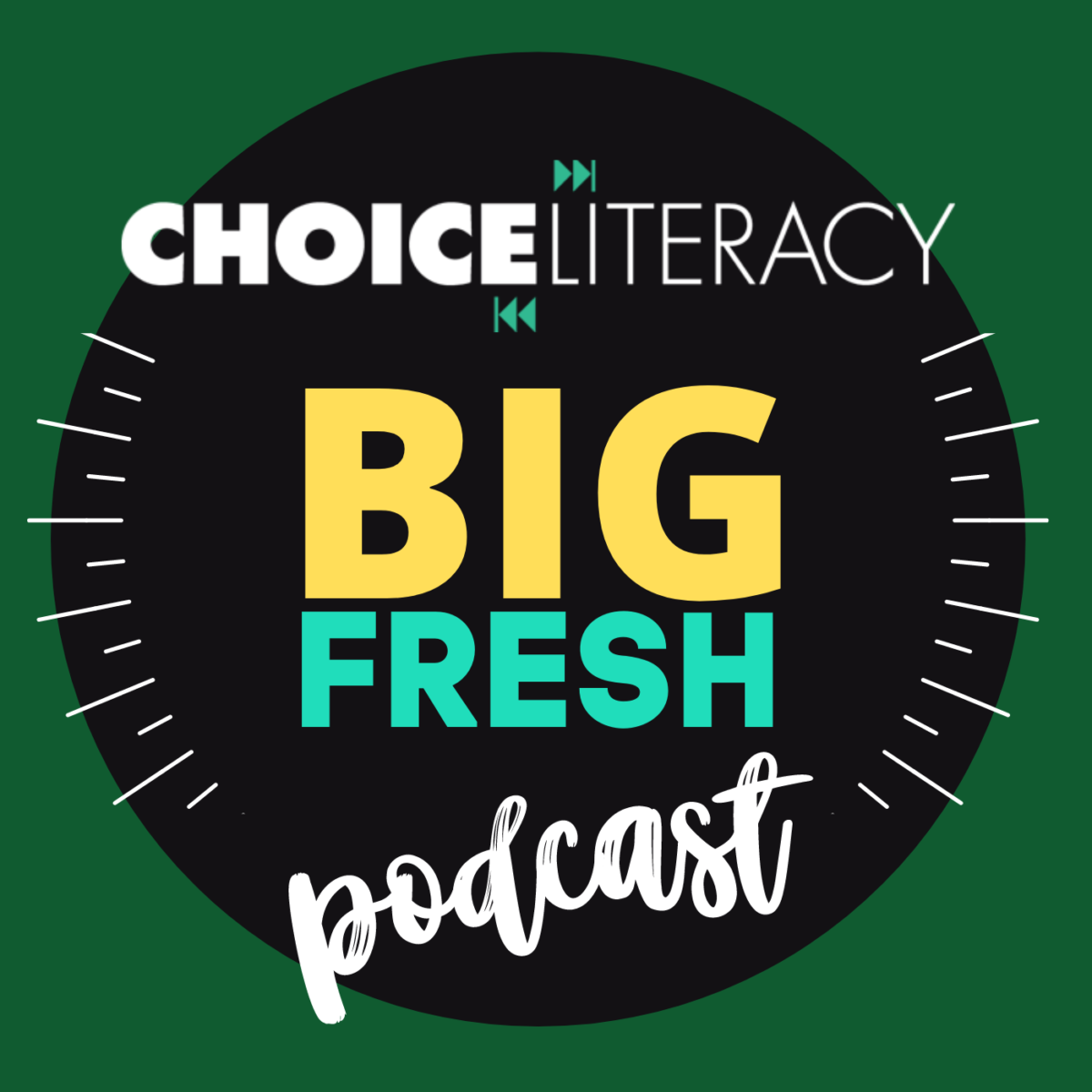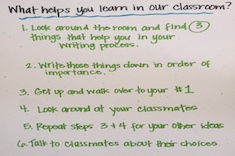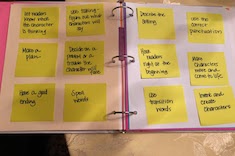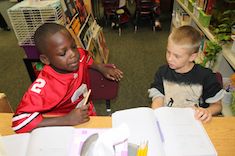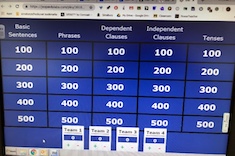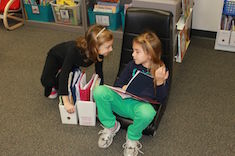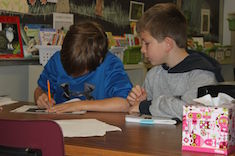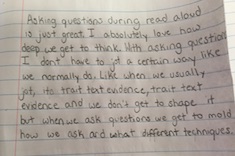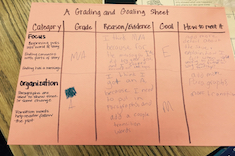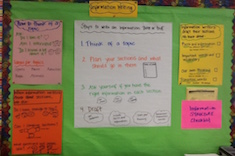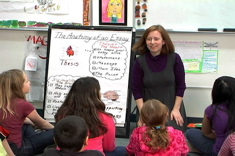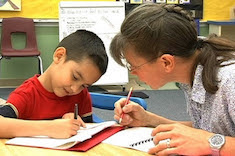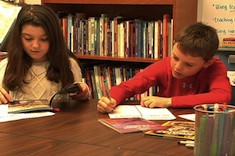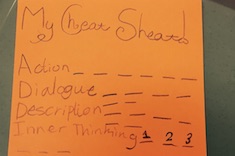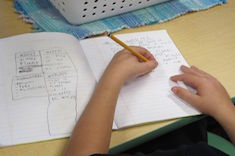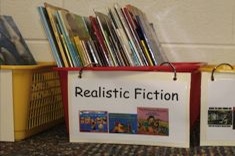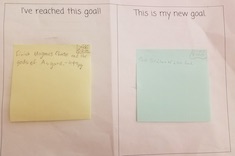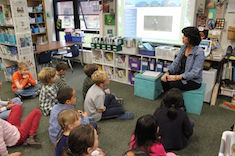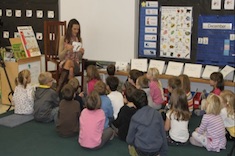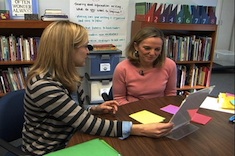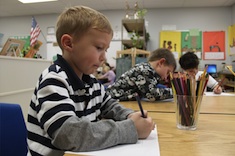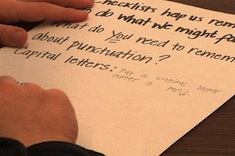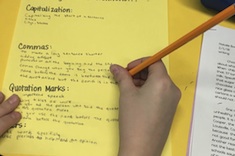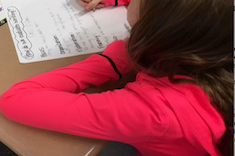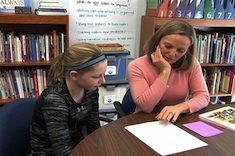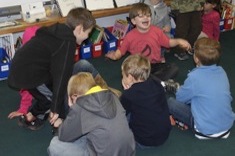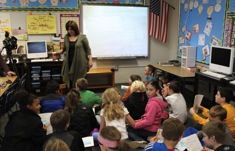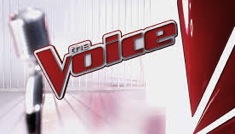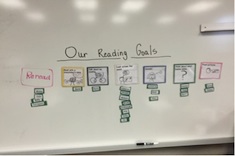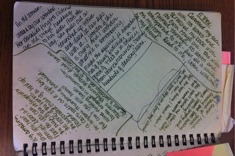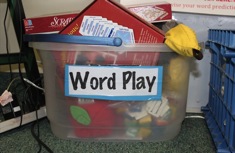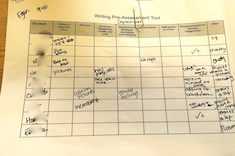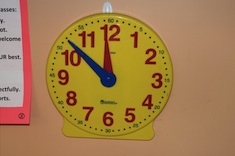Melanie Meehan
Melanie Meehan has been the Elementary Writing and Social Studies Coordinator in Simsbury, Connecticut since 2012. Melanie wrote Every Child Can Write, published by Corwin Press in October 2019, and, The Responsive Writing Teacher, co-written with Kelsey Sorum, published in March 2021. Connect with Melanie on Twitter @melaniemeehan1.
Latest Content
Encouraging Agency
Melanie Meehan shares three tips on helping students be independent and productive writers. She also includes a hefty list of craft moves from mentor texts to use while teaching writers.
Writing Graphic Novels
Melanie Meehan shares the immersion process of writing graphic novels with middle grade students. You won’t want to miss the incredible student writing that shows the power of offering choice to young writers.
Using Images for Rehearsal in Persuasive Writing
Melanie Meehan makes a case for the power of pictures to provide a foothold and access point for students to enter the writing pathway. She shares an example of using images to engage in persuasive writing strategies.
What “Should” Kindergarten Writing Look Like at This Point in the Year?
Melanie Meehan shares insights to emphasize the importance of responding to emergent writers and understanding the progression of young writers.
Classroom Libraries Podcast
Melanie Meehan and Ruth Ayres discuss classroom libraries.
Craft Moves in Before the Ever After
Melanie Meehan unlocks a few craft moves in Before the Ever After by Jacqueline Woodson.
Transfer of Learning Podcast with Melanie Meehan
Melanie Meehan discusses the transfer of learning using pictures.
How Pictures Can Engage and Inspire Writers
Melanie Meehan shows how pictures offer ways to expand access to students as writers by providing scaffolds and inspiration.
Celebrating with Fan Fiction
Melanie Meehan shares how a short dip into fan fiction can be a wonderful way to inject some play and raise engagement in writing.
Writing Conference: Establishing Setting
Melanie Meehan uses A Day’s Work as a mentor text to help fifth grader Emily develop setting in her writing.
Using Humor to Teach Language Standards
Teaching parts of speech is viewed as dreary work for most teachers. Melanie Meehan shares how you can infuse some fun into it with a little bit of humor.
Getting Students in the Learning Zone
The zone of proximal development (or ZPD) is the sweet spot for learning—just enough challenge with just enough support to take on the challenge. Melanie Meehan shares how teachers can create scaffolds in their classrooms that help students find their own ZPDs.
Mentor Text Craft Guides
Melanie Meehan helps students see the craft moves in mentor texts by tucking brief guides into many of her favorite children’s books in the classroom library.
Mastering Conventions
Even eight-year-olds are expected to master a dozen or more conventions. Melanie Meehan shares a process for helping students focus on the small steps needed to master any convention with peer support.
Text Set Resources
Melanie Meehan shares some of her favorite resources for developing text sets.
Helping Students Understand What Works for Them
Want students to become more independent? Melanie Meehan recommends that you take each student through a reflective process to figure out what learning processes and habits work for them.
Finding Time for Writing Shares
Finding time for writing share sessions may begin with trying out a few different options to see what works in your classroom. Melanie Meehan presents some of her favorites.
Boosting the Confidence of Writers
We can teach students craft moves for their writing and how to punctuate. But how do we build their confidence? Melanie Meehan helps Aaron see his needs as a writer, but even more importantly, his strengths.
Talking Through Characters
Melanie Meehan shares activities that help students talk about their characters before writing about them in a realistic fiction unit.
Becoming More Inclusive
Every teacher wants to be more inclusive. But where do you begin? Melanie Meehan presents three practical starting points.
The Power of Paper
Melanie Meehan details how different paper options can be a powerful scaffold for students as they explore different writing genres. She includes many sample scaffolds to download for use in an opinion writing unit.
Revising Dialogue in Narrative Writing
Melanie Meehan finds that a “lift the flap” strategy works for showing students different revision options with dialogue.
Grammar Games
Melanie Meehan shares two of her favorite games for teaching grammar, including templates and web resources.
The Importance of Correct Examples
Melanie Meehan explains why it is important to mentor students who are struggling with correct examples, and why she cautions writing teachers to avoid “find the mistakes” exercises.
When Students Set Intentions
When students set intentions, reflection and celebration go hand in hand. Melanie Meehan explains how teachers can help students become more explicit about intentions with practical cues from bulletin boards and index cards.
Content and Context
Melanie Meehan considers content and context for students who struggle to master new skills because of a lack of background knowledge.
Improving Turn-and-Talks
Melanie Meehan shares questions and reflection prompts to make the turn-and-talk strategy more effective.
Looking Forward with Students
Melanie Meehan uses reflective questions and video to build a library of materials at the end of the year to use with next year's class.
Backward Chaining
How do you help students who are far behind their classmates in tackling writing projects, and have had years of learned helplessness in approaching complex tasks? Melanie Meehan takes on the challenge with a backward-chaining model.
Grammar Instruction in Fourth Grade
Melanie Meehan coaches a fourth-grade teacher who is trying to improve his grammar instruction.
Inspiring Students to Revise
Melanie Meehan uses revision strips to move young writers beyond "I'm done!" and into expanding and editing their writing.
Questioning Within Read Alouds
Melanie Meehan looks at the issue of engagement through the lens of student questions during read alouds, and shares a strategy to provoke more thoughtful student participation.
Asking Students to Grade Themselves
Asking students to assess and grade their own work cements learning and deepens understanding for many students, but only if it is done in a thoughtful, collaborative way. Melanie Meehan takes you step-by-step through the process in a fifth-grade classroom.
Bulletin Board of Independence
Melanie Meehan uses independence bulletin boards to provide students with options when working on their own during units of study.
Keeping Minilessons Short
Melanie Meehan gives three quick management tips for tackling the challenge many teachers face — keeping minilessons short.
More Productive Writing Workshops
Melanie Meehan shares how everything from transitions to clutter can provide clues for how to increase student output and enjoyment.
Tools for Striving Writers
Sometimes a student just. won’t. write. Melanie Meehan shares her favorite tools in her bag of tricks to get the pencil or pen moving across the page.
Exploring Text Features
Melanie Meehan works with a small group to talk through how nonfiction text features might enhance their informational writing.
Student-Designed Development Cards
Melanie Meehan finds that student-designed development cards are a great way to get students invested in literacy goals.
Tapping into What Students Know
Melanie Meehan shares the value of assessing what students know first, and then tapping into this knowledge in new units.
Assessing Instruction in the Midst
Melanie Meehan shares some ways teachers can press the pause button in the midst of teaching to assess whether they are teaching the right lesson at the right time.
Mentor Texts and Important Reminders
Melanie Meehan shares four important tips for using mentor texts effectively with students of any age.
Teachers Who Write
Melanie Meehan explains why your own writing, however imperfect it is, might enhance your teaching tremendously.
Teaching Students to Start at the Right Place
Melanie Meehan uses focus questions for teaching students to start at the right place in their writing, moving them beyond the bed-to-bed stories that plague so many literacy workshops.
Getting the Ball Rolling in a Realistic Fiction Unit
Melanie Meehan helps elementary students move from narratives to realistic fiction by beginning with “facts” about their fictional characters.
Goal-Setting Ideas for Students
Melanie Meehan shares a wealth of ideas for better goal-setting with students.
Increasing Student Engagement During Minilessons
Melanie Meehan has tips for keeping students engaged during minilessons.
Why I Don’t Like Erasers
Melanie Meehan explains why erasers can be problematic in writing workshops, beyond just eliminating the ability of teachers to see the progression of revisions in a young writer's work.
The Importance of Their Words
Melanie Meehan shares strategies and prompts for helping easily distracted young learners focus in conferences.
Teaching Punctuation with Poetry
Melanie Meehan discovers that the spare form of poetry is especially useful for teaching conventions.
Table Charts in Second Grade
Melanie Meehan chats with second-grade teacher Nadia Egan about her ingenious use of table charts to enhance conferences and whole-class instruction.
Mentor Texts for Crafting Nonfiction
Melanie Meehan talks with a third-grade teacher about how she helps students focus on craft elements in nonfiction mentor texts.
The Value of Pre-Assessment
Melanie Meehan explains why a baseline assessment at the start of any writing unit is well worth the time.
Digging into Research Questions
Melanie Meehan explains how helping students deepen their questioning strategies leads to more thoughtful research projects.
End-of-the-Year Reflection
Melanie Meehan shares a series of thoughtful questions to help students reflect on their process as writers, and what they need as they move into the summer and new classrooms.
Developing Individualized Convention Checklists with Students
Melanie Meehan works with third graders to develop personalized conventions checklists.
An Individualized Conventions Checklist
Melanie Meehan finds that a flexible conventions checklist that students develop according to their own needs is the best way to ensure conventions are taught in the context of authentic student work.
Strategies for Elaboration in Opinion Writing
Melanie Meehan works with fifth graders who are struggling to elaborate on themes in their opinion writing.
Student Self-Assessment Strategies
Melanie Meehan works with fifth graders to help them create their own set of indicators of success in a writing unit.
From Compliments to Challenges: The Conferring Card
Melanie Meehan uses a conferring card in her writing conference with Cara to ensure she has a record of the strengths and revision possibilities they discussed.
Getting Creative with Writing Celebrations
A celebration is the pause that refreshes between writing units for many teachers. Melanie Meehan shares suggestions for creative celebrations.
Wonder and React
How do you scaffold students for independent work? Melanie Meehan finds Wonder and React is a great strategy to use with fifth graders during an information writing unit.
The Intersection of Social Studies and Language Arts
Melanie Meehan writes about how teachers in her state are dealing with the time-crunch issue in social studies instruction by naturally integrating more social studies into the language arts program.
Debating How to Begin Stories
Melanie Meehan shares a minilesson using student writing as a model for experimenting with leads.
Engaging a Room Full of Third Graders
Melanie Meehan works with a third-grade teacher to rouse interest from a class of compliant students who lack engagement.
Provoking Young Readers
Melanie Meehan finds read aloud is a great time for children to connect opinions and experiences.
Setting Goals During Mini-Celebrations
Melanie Meehan recommends linking goal setting to small celebrations as a great way to build community and skills at the same time.
Choices for Paragraphs
Melanie Meehan finds third grade is a good age for helping students develop paragraphing skills.
Video for Last Days of School
Melanie Meehan encourages teachers to build a video collection of students at work to use with next year’s class.
Celebrating “The Voice” of Writers
Melanie Meehan presents a fun activity for late in the school year that uses the format of The Voice television series.
Setting Goals with Students
Melanie Meehan shares anchor charts and strategies for goal-setting.
Giving Students a Notebook Tour
Melanie Meehan finds a notebooks tour is a terrific minilesson for helping students expand the ways they use notebooks.
Three Classroom Games for Literacy Learning and Laughter
Melanie Meehan suggests some favorite classroom games for building literacy skills.
Guiding Principles for Conferring
Melanie Meehan shares what’s essential in conferring.
Administering a Pre-Assessment
Melanie Meehan works with a new teacher to develop and administer a writing pre-assessment early in the school year.
Talking Through Characters
Melanie Meehan shares activities that help students talk about their characters before writing about them in a realistic fiction unit.
Maximizing Instructional Time at the Start of a New Unit
Time is precious in classrooms, so Melanie Meehan shares strategies to ensure it isn't wasted at the start of new writing units by teaching skills students may already possess.
Browse Content By
Type
Category
- Assessment Tools
- Big Fresh Archives
- Booklists
- Choice Numeracy
- Classroom Design
- Common Core
- Community Building
- Conferring
- Content Literacy
- Digital Literacy
- English Language Learners
- Equity
- Family Relations
- Free Samples
- Guiding Groups
- Leadership
- Literacy Coaches
- Mentor Texts
- Minilessons
- New Teacher Mentors
- Podcasts
- Poetry
- Quote Collections
- Reading Strategies
- Self Care
- Struggling and Striving Learners
- Talking and Listening
- Teacher Study Groups
- Teaching Reading
- Teaching Writing
- Word Study and Vocabulary
Author
- Melissa Quimby
- Nawal Qarooni
- Gwen Blumberg
- Julie Cox
- The Lead Learners
- Hannah Tills
- Josie Stewart
- Ruth Metcalfe
- Mallory Messenger
- Becca Burk
- Jodie Bailey
- Vivian Chen
- Mary Brower
- Tiffany Abbott Fuller
- Stephanie Affinito
- Ruth Ayres
- Leigh Anne Eck
- Heather Fisher
- Shari Frost
- Julie Johnson
- Suzy Kaback
- Gigi McAllister
- Shirl McPhillips
- Melanie Meehan
- Cathy Mere
- Debbie Miller
- Tara Barnett and Kate Mills
- Tammy Mulligan
- Dana Murphy
- Bitsy Parks
- David Pittman
- Brenda Power
- Heather Rader
- Matt Renwick
- Mandy Robek
- Christy Rush-Levine
- Gretchen Schroeder
- Jen Schwanke
- Brian Sepe
- Katherine Sokolowski
- Stella Villalba
- Jennifer Vincent
Grade Level
Choice Literacy Membership
Articles
Get full access to all Choice Literacy article content
Videos
Get full access to all Choice Literacy video content
Courses
Access Choice Literacy course curriculum and training





